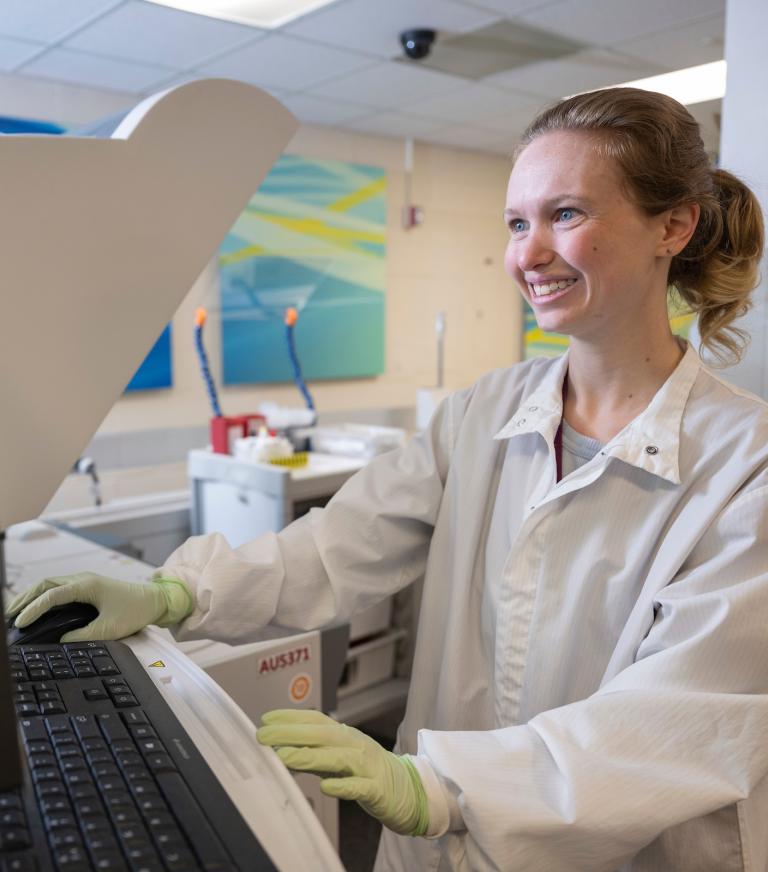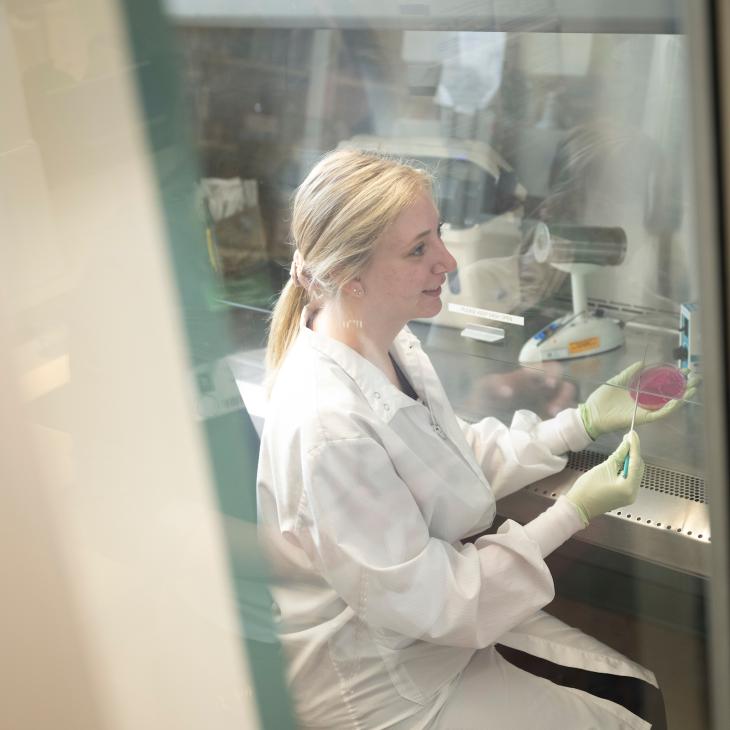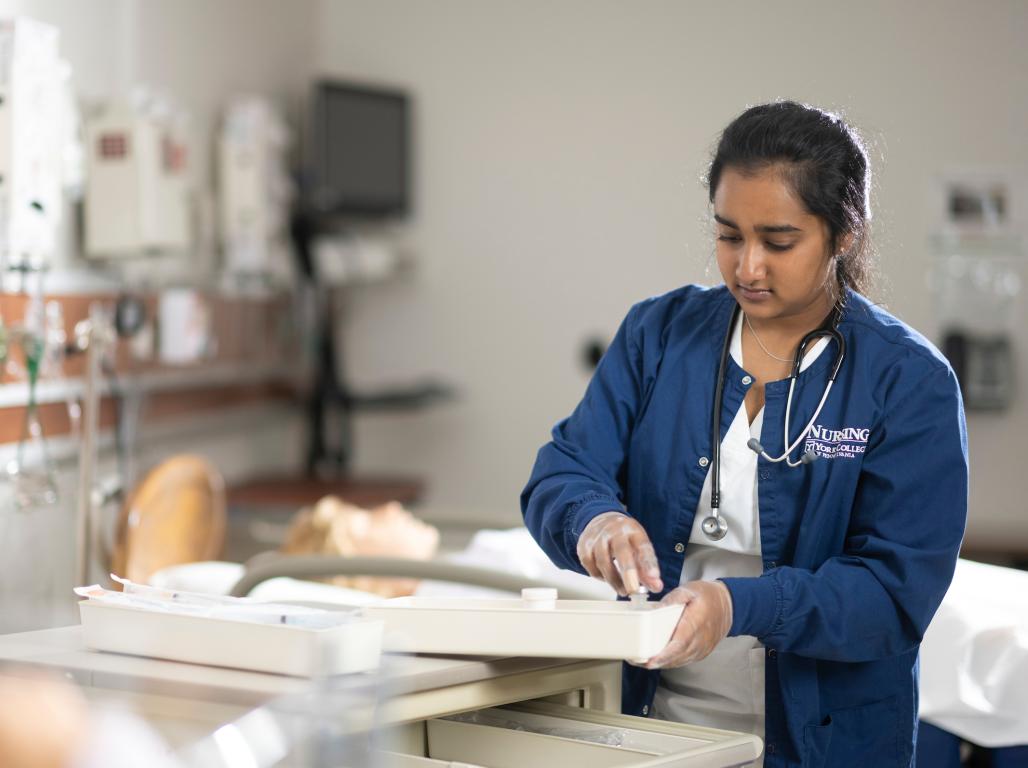Medical Laboratory Science

Program Type
B.S.
Est. Time to Complete
4 Years
School
Dr. Donald E. and Lois J. Myers School of Nursing and Health Professions
Delivery Mode
On Campus

Make an impact in the world of medicine and beyond.
At York College of Pennsylvania, the Bachelor of Science (B.S.) in Medical Laboratory Science degree program prepares students for dynamic roles in the medical field and Medical Lab Scientist (MLS) certification.
Whether you see yourself developing new medications for the pharmaceutical industry, conducting medical research in a hospital lab, or finding new ways to bring comfort to animals through veterinary studies — York College can give you the tools to get there.
After three years of classroom learning, you will embark on a year of clinical study to gain exposure to various fields within laboratory science. Guided by our expert faculty and enriched by hands-on training, you'll be poised for fulfilling and challenging careers as graduates.
About the Bachelor of Science in Medical Laboratory Science
Medical Laboratory Science Program Requirements
To succeed in laboratory science careers, students in the B.S. in Medical Laboratory Science degree program achieve a balance between classroom learning and practical clinical lab experience in real healthcare settings.
Requirements for the B.S. in Medical Laboratory Science include:
- Minimum 122 credits in general education and Medical Laboratory Science core courses (approximately three years or six semesters)
- Clinical rotation in a hospital-based education program (senior year)
Prior to entering the clinical program, courses cover key scientific and medical concepts such as:
- Molecular Biology
- Human Anatomy & Physiology
- Genetics
- Biochemistry
- Immunology
- Applied Calculus
- Behavioral Sciences
If you are transferring to the program with previous college credits, your course and credit requirements may differ. Learn about transferring to York College.
Admissions and Aid
In addition to the York College undergraduate admission requirements, applicants to the Medical Laboratory Science bachelor’s program must demonstrate:
- Minimum 2.0 GPA in high school biology, chemistry, and algebra
- Minimum SAT score of 1050 (450 minimum in critical reading and math components)
Learn how to apply and find key financial aid information to start your journey.
Earn a B.S. in Medical Laboratory Science at York College of Pennsylvania
York College of Pennsylvania’s Bachelor of Science in Medical Laboratory Science degree program positions students at the forefront of laboratory diagnostics, research, and industry, and serves as a gateway to further professional training.
Ready to get closer to your critically important career as a lab scientist? Request more information today.
Career Outcomes in Clinical and Medical Sciences
Graduates from our B.S. in Medical Laboratory Sciences secure positions in hospital laboratories, outpatient clinics, blood banks, and research institutions. Earning a bachelor’s degree from York College, combined with the hands-on training in an accredited MLS program, prepares you to sit for key certification exams. These may vary by state or employer.
This program paves the way for specialized roles such as:
- Medical Laboratory Scientist (MLS) or Medical Laboratory Technician (MLT)
- Clinical Laboratory Scientist (CLS)
Beyond healthcare settings, opportunities abound in public health, education, government agencies, and even in industries like pharmaceuticals, diagnostics, and biotech. Whatever your desired path, the skills acquired through the Bachelor of Science degree propels you toward your envisioned laboratory career.
Moreover, this degree establishes a solid foundation should you decide to seek advanced certifications or pursue higher education in graduate or professional programs. As you accumulate experience in laboratory settings, you can progress your career in areas like laboratory management or product development.
Medical Laboratory Science Salaries
Entering the field of medical laboratory science offers competitive salaries, especially for those equipped with a bachelor’s degree. While your pay can vary based on location, specialization, and experience, there's potential for growth and advancement, especially in top-paid areas including outpatient care and pharmaceutical and medicine manufacturing.
The Bureau of Labor Statistics (BLS) and Salary.com indicate average annual salaries for key positions in the medical lab sector in 2023 as follows:
- Clinical Laboratory Technologists and Technicians—$57,380/year
- Medical Laboratory Scientist—$58,801/year
Career Support and Local Partnerships
York College’s partnerships and affiliations with healthcare agencies and providers in Pennsylvania, Virginia, and New York provide a range of options for your one-year clinical rotation and additional internship experiences in settings such as microbiology labs in hospitals.
In addition to hands-on experiences tailored to your interests and circumstances, York College offers comprehensive career services and support in your professional journey, from on-campus employer or networking events to interview and résumé assistance.
Fourth Year Clinical Experience
After three years of immersive classroom instruction, students in the Medical Laboratory Science program embark on a clinical rotation that translates classroom learning into an array of practical skills. Upon completion of the Medical Laboratory Science program at York College, you will be required to pass the American Society for Clinical Pathology Board of Certification Medical Lab Scientist (MLS) Certification.
This comprehensive experience ensures you:
- Engage with a range of modern laboratory equipment and techniques
- Train across various areas of medical laboratory science, including microbiology, chemistry, hematology, and immunology
Under the tutelage of experts in accredited clinical facilities, cement your theoretical knowledge and gain exposure to the real-world intricacies and demands of medical laboratory science.
Local Hospital-Based Affiliated MLS Programs
Students in the Medical Laboratory Science bachelor’s program can apply to complete their clinical experience through any program accredited by the National Accrediting Agency for Medical Lab Science (NAACLS) or our regional affiliated clinical locations.
York College holds affiliations with:
- Pennsylvania College of Health Sciences
- Reading Hospital School of Health Sciences
- Sentara RMH Medical Cente
- UMPC Chautauqua
- WellSpan Health
Clinical Requirements
Upon reaching their junior year, students initiate the process by applying to accredited clinical programs. Admission to York College does not guarantee admission to a hospital-based education program. Acceptance is decided upon factors including:
- Overall and science subject GPA
- Personal essay
- Letters of recommendation
- Interview
Complete the core requirements of study at the College with an average GPA of 2.5 in science and mathematics as well as a cumulative GPA of 2.5 or higher in order for the College to recommend the student for the clinical year.
Within the clinical medical laboratory science program, you’ll complete rotations in specialized hematology and immunology labs and other areas.
Clinical Program Handbook
Students enrolled in a clinical program are expected to follow the York College Department of Health Professions' established policies and practices. The Clinical Program Handbook serves as a guide to support students' awareness of these policies and provide advice about how to best adhere to them throughout your academic experience.
Mentored Research Projects
Harness the full potential of your York College education and experience through mentorship opportunities both in and outside of class.
From finding new insights through faculty research initiatives or connecting with employers for an internship or network-building, learn directly from experts in diverse medical and clinical skill areas such as virology, hematology, microbiology, immunology, and more.
Medical Lab Science Faculty
At YCP, we prioritize building strong connections with our students, equipping them to excel in personal, academic, and professional arenas. The Department of Health Professions boasts a committed team of faculty and staff, ready to guide and support your journey through the Medical Laboratory Science program.
Learn Skills for In-Demand Diagnostic and Clinical Careers
Our Medical Laboratory Science major program ensures graduates are equipped to deliver high-quality laboratory services, be it hospitals, research institutions, or specialized clinics. They are prepared to:
- Utilize advanced techniques to decode complex molecular and genetic structures
- Use comprehensive knowledge of human anatomy and physiology to interpret laboratory results
- Detect and characterize microorganisms for effective patient treatment
- Implement state-of-the-art laboratory methods ensuring precision in diagnostics and research
- Understand blood disorders and the intricacies of the immune system through deep dives into hematology
- Employ statistical methods to validate findings
- Translate complex laboratory data into actionable insights
Clinical Experience
Clinical Requirements
Admission to York College does not guarantee admission to the clinical instruction facilities clinical year.
- Complete the core requirements of study at the College with an average of 2.5 in science and mathematics as well as a cumulative GPA of 2.5 or higher in order for the College to recommend the student for the clinical year.
- During your junior year, you will apply for clinicals at an accredited program to be completed during your senior year. You can choose to apply at one of our five affiliated programs or another accredited clinical program in the United States.
- Upon completion of the Medical Laboratory Science program at York College, you will be required to pass the Medical Lab Scientist (ASCP) Certification.
Clinical Locations
As a Medical Laboratory Science student, you will gain practical experience through the year-long clinical rotation in an accredited clinical program.
Students may apply to any NAACLS accredited program. York College maintains affiliate status with hospital Medical Laboratory Science programs at the following sites:
- Saint Joseph's University - Lancaster, PA
- Reading Hospital School of Health Sciences - Reading, PA
- Sentara RMH Medical Center - Harrisonburg, VA
- Penn Medicine - Philadelphia, PA
- Penn State Hershey - Hershey, PA
- WellSpan York Hospital - York, PA
Additional programs can be found through the National Accrediting Agency for Medical Lab Science (NAACLS).
Frequently Asked Questions
What does a Medical Laboratory Scientist do?
- Examine and analyze body fluids, tissues and cells
- Identify infective microorganisms
- Analyze the chemical constituents of body fluids
- Identify blood-clotting abnormalities
- Cross-match donor blood for transfusions
- Test blood for drug levels to measure the efficacy of particular treatments
- Evaluate test results for accuracy and help interpret them for the physician.
What is the median salary? The median salary for a medical laboratory scientist is $50,000 - $60,000 per year.
Is there a job demand in this field? With an aging population and increased diagnostic and evaluative technology, the job growth rate is expected to increase 14-16% through 2026.
What are some possible places for employment for a medical laboratory scientist?
- Hospital, Research, Forensic and Pharmaceutical labs
- Blood Bank
- Veterinary Offices
- Center for Disease Control
- Department of Agriculture Laboratories
Department of Health Professions Clinical Program Handbook
Students enrolled in a clinical program are expected to follow the York College Department of Health Professions' established policies and practices. The Clinical Program Handbook serves as a guide to support students' awareness of these policies and provide advice about how to best adhere to them throughout your academic experience.
Clinical Affiliate |
Start |
End |
App Deadline |
Cap |
Tuition |
Website |
Clinical Program Director |
| Wellspan York Hospital | Mid-July | Mid-June | Aug.-Oct. 25 | 10 (usually take 2-5) | $10,250 | Program Information | Christina Scott cscott6@wellspan.org 717-851-2473 |
| St. Joseph University | Aug. | Aug. | Feb. 1 | 11-12 (usually 1-2) | $33,494 ($5000 for program and $593/credit for undergraduate tuition) | Program Information | Sherry Schoenberger ssoost@sju.edu 717-947-6193 |
| Reading Hospital | Mid-July | Mid-June | Oct. 20 | 4-6 (usually 0-1) | $6,500 | Program Information | Ethan Kentzel Ethan.Kentzel@towerhealth.org 484-628-0555 |
| Penn Medicine | Aug. or Jan. | May or Dec. | Oct. 1 or Mar. 1 | 12 | $13,000* | Program Information | Derick Lim derrick.lim@pennmedicine.upenn.edu 267-253-7938 |
| Penn State Hershey (PSH) | June | Apr. | May - Jan. 15 | 10 | $15,000 | Program Information | Mary Beth Miele, PhD MLS@pennstatehealth.psu.edu 717-531-7461 |
| Sentara- VA (2 cohorts) | June or Jan. | June or Dec. | None – Rolling | 12-14 (usually 1-2) | $4,500 | Program Information | Cyndee Lowe cslowe@sentara.com 540-564-7234 |
Notes: * Penn Med will reimburse the full cost of tuition if a student accepts employment with the hospital upon graduation.
Medical Laboratory Science Courses
Your class schedule will include core courses for your major, Gen Next general education classes, and electives.
| Course Name | Course Code | Credits |
|---|---|---|
| Microbiology for Allied Health | BIO 230 | 4 Credits |
| Genetics | BIO 240 | 4 Credits |
| Clinical Chemistry | MLS 402 | 6 Credits |
| Clinical Hematology / Coagulation | MLS 403 | 6 Credits |
| Clinical Immunology / Serology | MLS 405 | 6 Credits |
Careers in Medical Laboratory Science
A bachelor's degree in Medical Laboratory Science opens up a variety of career opportunities. Some of your options may include:
Medical Laboratory Scientist
Medical Technologist
Pathologist Assistant

Build your dream career, one day at a time.
This is day one. From your first semester on campus through graduation day, York College offers expert advice, professional development opportunities, and personalized support to help you navigate the choices that influence your future.
Explore resources for a successful college experience:
Frequently Asked Questions
With a medical laboratory science degree, graduates primarily become medical laboratory scientists or technicians, working in the medical and health fields without needing to attend medical school. They play a crucial role in diagnosing and preventing diseases by analyzing patient samples.
While this degree provides a robust foundation in medical knowledge and laboratory skills, becoming a doctor requires further education. To become a doctor, one would need to attend medical school after completing a bachelor's degree and meet other specific prerequisites.
Yes, medical laboratory science is a rewarding career. The demand for medical laboratory scientists is growing due to the increasing need for medical diagnoses and the advancement of medical technology. Professionals in this field enjoy salary and advancement potential, job stability, and the satisfaction of playing a pivotal role in patient care. Furthermore, the diverse specialties within the field allow for various areas of interest and expertise.
A medical laboratory scientist can work in a variety of settings. These include:
- Hospital laboratories
- Diagnostic laboratories
- Blood banks
- Veterinary offices
- Research facilities
- Public health agencies
- Pharmaceutical, diagnostic, and biotechnology companies
The versatility of the BS in Medical Laboratory Science degree means that medical laboratory scientists have opportunities in both clinical and nonclinical settings.
Meet the Faculty
View All FacultyMedical Laboratory Science in Action
View All NewsRelated Programs
Biochemistry
York College of Pennsylvania’s interdisciplinary BS in Biochemistry degree program is a gateway to a multitude of post-graduate opportunities in biomedical science, healthcare, academics, industry, and public health.
Through a student-centered approach to learning, Biochemistry majors at York College prepare to enter the field as trained chemists or pursue further education backed by internships and research experience. You’ll be ready to tackle your career prospects in one of the top regions for employers in the biochemical and biomedical industries.
Cannabis Chemistry
York College of Pennsylvania’s Bachelor of Science (BS) in Cannabis Chemistry degree program provides specialized education in the extraction and purification of plant products as specialized training for careers in the cannabis industry, plant chemistry, and various environmental applications.
Health Sciences
ork College of Pennsylvania’s Bachelor of Science (B.S.) in Health Sciences degree program is designed to increase students’ career opportunities across the healthcare industry.
Many fields within healthcare are growing rapidly. With three degree concentrations to choose from, our B.S. in Health Sciences program trains students interested in professional medical careers like physical therapist or pharmacist, those interested in administrative healthcare positions, and students seeking careers in community settings and human services.
Nursing
When you’re passionate about helping people, you need a career that allows you to make a difference. The bachelor of science in Nursing (BSN) at York College prepares future nurses to do just that.
Our Nursing degree program gives students access to a state-of-the-art simulation lab and professional equipment, as well as faculty who take a vested interest in their success. BSN majors gain hands-on experience during clinicals, working with our healthcare partner organizations across the region, including local hospitals and medical centers.
Medical Imaging
York College of Pennsylvania’s Bachelor of Science (BS) in Medical Imaging degree program helps students embark on rewarding healthcare careers. From learning how to operate an x-ray theater to using technical equipment, students in the Medical Imaging program become experts in the imaging sciences, develop a high standard of patient care, and learn alongside working professionals.
Premedical Sciences
York College of Pennsylvania’s Bachelor of Science (BS) in Premedical Sciences degree program prepares students academically and holistically for competitive pre-professional programs in medicine.
If you aspire to pursue a career in medicine, this premed major program offers a comprehensive education in the essential sciences and the foundation necessary for the rigors of medical school, dental school, PA school, pharmacy school, and more.






